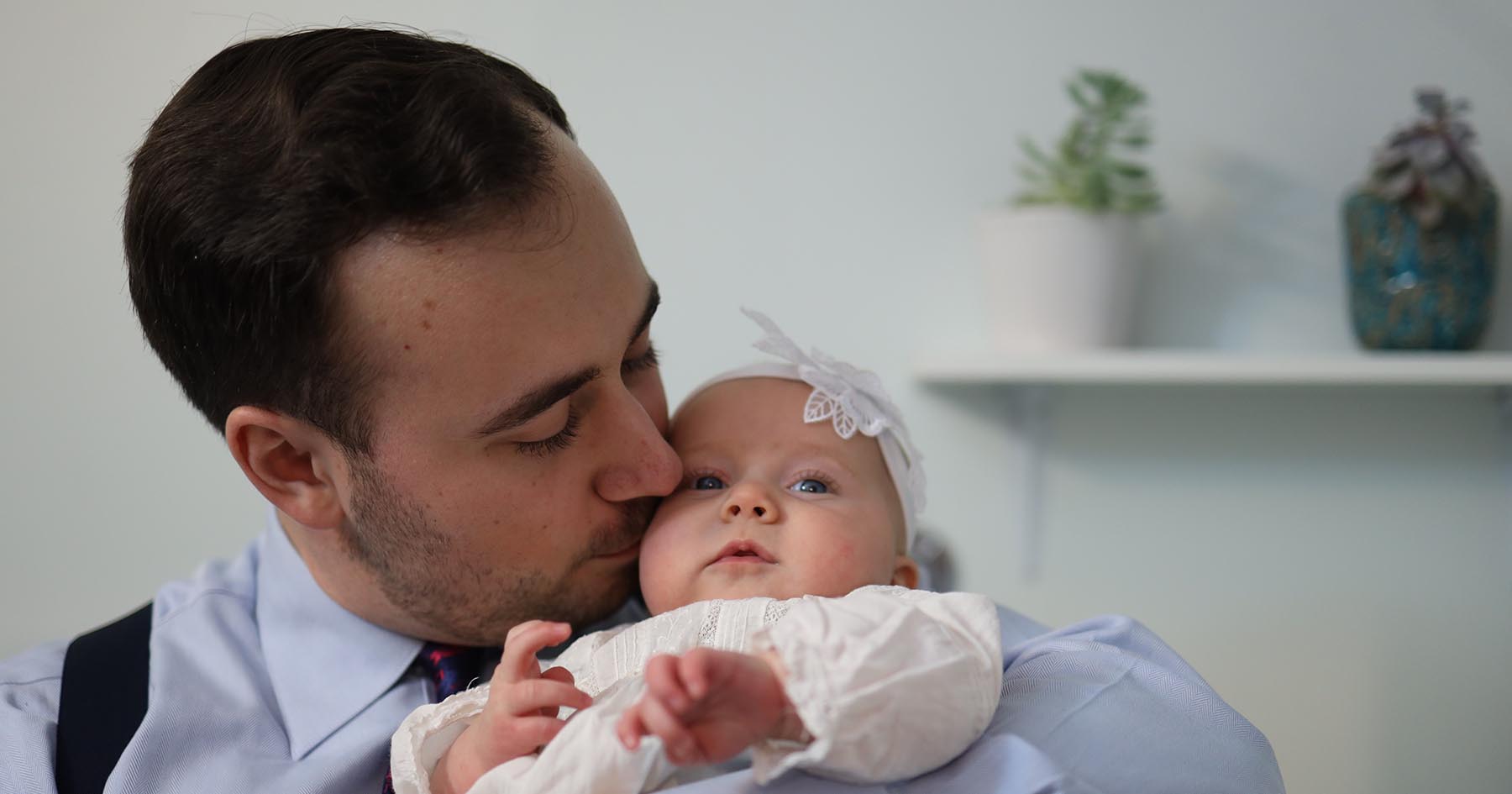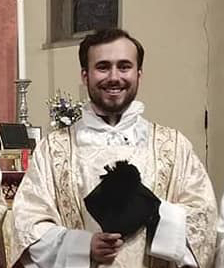There is an old Thomistic adage that grace does not destroy nature but rather perfects it. This means in part that God uses the ordinary stuff of human existence—our bodies, our intellect and will, our hopes and aspirations—to fulfill his creative and redemptive purposes, perfecting our natural aptitudes, appetites, and potential and, in so doing, elevating us to share in his divine life. This is why it is especially fitting that God should have chosen to redeem human beings by being born as one, by living a human life, by dying a human death, and by exalting human nature to the right hand of the Most High.
The wonderful thing about the incarnation is its irrepressible ordinariness. As we recalled at Christmas, the birth of the God-Man in time and space is, the miraculous circumstances of his conception excepted, rather like any other birth, the sort of thing that has happened again and again from the beginning of creation—and that is exactly the point of it! And yet it is this birth, this coming of God in human flesh, that transfigures all of human history before and after it: creature and Creator are forever joined, never to be sundered; human nature, wondrously created, is more wondrously restored and glorified; human generation and human life are raised above simple biology and are given a new spiritual vocation as the means by which human beings are incorporated into the life of the Most Holy Trinity.
What on earth, you may wonder, has any of this to do with this article’s theme, parenthood and faith? In the months since the birth of my daughter, Mathilda, I have been reflecting with amazement upon the ways in which God uses the ordinary things of life to effect his loving purposes in the world. The birth of a child, and especially of a first child, is something utterly ordinary—it’s being going on since the dawn of time, after all—and yet completely transformative. I have come increasingly to realise that the significance of a child’s birth is not exhausted by its biological or even by its emotional dimensions, and I intend what follows to be an articulation of some of the inchoate theological themes that have swirled around in my (admittedly rather tired) head since becoming a father.
A child is in every sense a new creation, a fresh work of the living God, and, through baptism, an heir of eternal life. In bringing Mathilda to birth, God initiated a new spiritual life, what we might call a “natural” spiritual life, which was given its distinctive Christ-likeness at her baptism on the Fourth Sunday of Advent last year. My own emotional response to my daughter’s baptism caught me off guard: I was confronted with the same heady mixture of awe, love, and trepidation that overcame me at Mathilda’s birth. Here, again, was new life, brought to birth by water and the Spirit into the incarnate life of Jesus Christ. And here, again, I had to take responsibility, along with my wife and Mathilda’s godparents, for nurturing that life. The enormity of this commitment has not yet fully sunk in. What a tremendous task God has given me and my wife: that we should assume responsibility not only for our own daughter—a task daunting enough—but for God’s own daughter as well!
Such a stupendous duty cannot be borne but by the transformation of our own spiritual lives as parents. A wise priest once said to me that marriage is ascesis, and this is especially true of one of the chief ends of marriage, the bearing and rearing of children (see the Book of Common Prayer, p. 564). That is to say that marriage and family life are a form of spiritual training, the right use of which draws us nearer to God. The first fruit of the ascetical discipline of parenthood is, to my mind, the virtue of death to self. Life in community always forces us to confront ourselves in relation to the other—other personalities, other wills, other aspirations besides and often in conflict with our own—and this is especially true of the relationship between parent and child. There is no negotiating with a crying baby, no compromise that can be struck between the child’s need to eat and the parent’s desperate yearning to sleep. The shriek of the infant is, to the parent, S. Paul’s maxim “Ye are not your own” writ very large indeed. In those moments, there can only be the surrender of the parent’s will, the mortifying of the parent’s own desires for the sake of the good of another who is so utterly dependent as to be unable even to express thanks. The newborn teaches the new parent as perhaps nothing else can the virtue of death to self, the setting aside of one’s special plans and pleasures for the good of neighbour and the glory of God.
Yet the challenges of parenthood are far outweighed by the hope and excitement that comes with the extraordinary newness of the live enfolding before one’s eyes. New milestones are reached at breakneck speed, only to be succeeded in a parent’s hopes by yet more milestones to come. The first flash of intention and recognition in Mathilda’s eyes, her first smile, her first laugh are not only delightful in themselves but are pregnant with promise for the whole life of possibility and discovery that lies ahead of her.
Of course, the spiritual life has its own milestones, and I am excited, as one who did not receive a Christian upbringing, to share these milestones with my daughter. I am excited, as Mathilda learns to speak, to help her articulate her first verbal prayers to God; I am excited, as she learns to read, to introduce her to the glorious mysteries of Sacred Scripture and to begin fulfilling the promise I made at her baptism to teach her the Lord’s Prayer, the Creed, the Decalogue, and the Catechism; I am excited for her to open her own Prayer Book for the first time and to discover little by little the genius of its pattern of prayerful living; I am excited to live the rhythm of the Christian life with her, the daily and weekly cycles of divine office and Eucharist, of feast and fast, of the solemn crescendi and the reflective diminuendi of the liturgical calendar. I look forward to her little voice echoing my “Amen” and belting out with that guileless self-assurance that only a child can muster the responses at Mass or some beloved hymn. In short, my dearest hope for my daughter is that she will discover the same joy in following Christ that I myself, by God’s grace, have found.
As with everything in parenthood—and, indeed, in life—hopes for the future are mingled with anxieties. One of my chief anxieties concerns the apparently terminal decline of the Anglican Church in this place, a decline only hastened by the pandemic. What right have I to raise my child to love and reverence a pattern of spiritual life—sights, sounds, people, places, holy things and holy words—that may soon “go the way of all flesh?” How can I bring up my daughter to cherish a tradition that, in all likelihood, will be extinct in this diocese and perhaps in this country within her lifetime? And, for that matter, how shall I bolster my own morale in the face of dire portents of future calamity? The well-meant comment “It is so nice to see a baby in church” cannot but be demoralising for the young parent who hopes that Canadian Anglicanism will outlive the usually grey heads that express this sentiment. Infancy and childhood are but stages of life that the Church, by dint of her catholicity, ought always to include; that the presence of children should be worthy of special comment in our churches is hardly a sign of rude ecclesiastical health. My family is fortunate to be part of the parish community of S. Barnabas, Victoria, which, for its part, does include many young families; yet one parish, or indeed four or five, does not a diocese or a national church make. I wonder, then, is it right that my daughter should be taught to love a world that is passing away?
In writing these words, I am conscious that the question I have posed is in fact the great conundrum of created existence. All things—not just the Anglican Church of Canada!—are passing away, hastening as soon as they are brought forth to return again to their mother dust. Given this harsh reality, why should anything come to be at all, and, for that matter, why should human beings will that anything should come to be? Why right have we to bring forth life in the midst of death? It is a question for which the logic of the created order, considered on its own, can afford no good answer. That new life—any new life—should spring forth at all is testament to the trust of that created order in the revivifying power of God, to whose providence alone the destiny of all things belongs. Only trust in this providence is sufficient to justify the bringing forth of new life in a dying world.
This hard, half-learned trust forces me to acknowledge that the future of the Church and my daughter’s place within it is not mine even to discern, far less to decide. And, indeed, this inability to know and control is the greatest challenge of parenthood, at least the greatest that I have encountered so far. We bring our children into a world of weal and woe, not knowing what shall be their portion of each and not able, despite the our most fervent efforts and most ardent yearnings, to do very much about it. To bring a child into the world necessarily involves risk—risk of pain, sorrow, loss. We are, after all, limited, mortal, contingent beings, coming to be and passing away according to God’s good pleasure, not our own. My daughter’s future and, for that matter, your future and mine belong to God alone. I cannot tell if the years ahead will bring packed pews or shuttered churches, glorious descants or silent organs, health or sickness, happiness or grief. What I can tell is that whatever the future holds for my daughter for apparent good or ill is embraced by the loving providence of a loving God, whose almighty Word and Wisdom “reacheth from one end to another mightily, and sweetly ordereth all things” (cf. Wis. 8.1).
This, it seems to me, is the essence of Christian hope, which I am discovering to be an essential virtue of parenthood. Christian hope is not a vain, vague optimism, but rather a trust that God can and will use all things, even our suffering, for his glory and our good; for there is no suffering, from the least inconvenience to the profoundest anguish, that has not been hallowed by the bloody sweat of the God-Man. It was only after meditating upon Christ’s Passion, after all, that Mother Julian of Norwich was able to perceive that “all shall be well, and all shall be well, and all manner of thing shall be well” amid the suffering of the world (Revelations of Divine Love, chap. 27).
But my hope for my daughter is more than a mere sense that, when sadness does touch her life as inevitably it will, it is for some “greater good” inscrutable to us but discernable to the secret counsels of God, true though this is. The fullness of my hope for her was expressed by the Church in the liturgy of her baptism, namely that “being baptized into the death of Christ, she may also be made partaker of his resurrection” (BCP, p. 529). My prayer for Mathilda is that the ordinary things of life, its joys, sorrows, opportunities, and duties, all hallowed by the divinely human life of Jesus Christ, will draw her nearer to him unto life eternal, “which things,” the Church assures us, “Christ, for his part, will most surely perform” (BCP, p. 525). The only balm for my fatherly worries is the assurance that it is the good will and pleasure of Jesus Christ to bring to fruition the good work he began in Mathilda at her baptism. My daughter’s welfare in this world and the next, which I will but am unable of myself to achieve, is also willed by God who is able to achieve it. All that remains for me and for her is to get out of his way and let him do the work of salvation that he, in his love, is only too eager to do.




